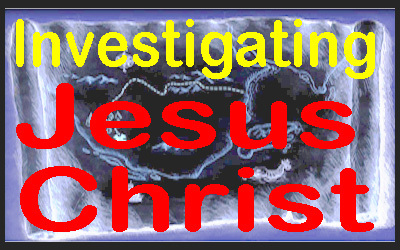
431.9K
Downloads
3365
Episodes
G’day and welcome to Partakers Christian Podcasts! Join us for uplifting Bible teaching, inspiring readings, heartfelt worship, powerful prayers, and fascinating church history. Whether you’re new to faith or growing deeper in your journey, we’re here to encourage and equip you. 🎧 Tune in, interact, and be inspired—wherever you are in the world.
G’day and welcome to Partakers Christian Podcasts! Join us for uplifting Bible teaching, inspiring readings, heartfelt worship, powerful prayers, and fascinating church history. Whether you’re new to faith or growing deeper in your journey, we’re here to encourage and equip you. 🎧 Tune in, interact, and be inspired—wherever you are in the world.
Episodes

Tuesday Jan 13, 2026
Investigating Jesus - Part 13
Tuesday Jan 13, 2026
Tuesday Jan 13, 2026

Investigating Jesus Part 13
Jesus’ Identity
27 Jesus and his disciples went on to the villages around Caesarea Philippi. On the way he asked them, “Who do people say I am?”
28 They replied, “Some say John the Baptist; others say Elijah; and still others, one of the prophets.”
29 “But what about you?” he asked. “Who do you say I am?”
Peter answered, “You are the Messiah.”
Mark 8:27-29.
This section of the Bible contains the verse, which divulges Jesus’ identity, when Peter calls Him the Christ or Messiah or Saviour (Mark 8:29). In the preceding few verses Jesus and the disciples were in Bethsaida and there is the incident where Jesus healed the blind man. Why did Jesus touch the blind man twice to heal Him? We don’t know for sure, but we do know that Jesus kept on until the man could see clearly. There are two things to remember.
Firstly, that Jesus was unable to do miracles because of people’s lack of faith.
Secondly, we also need to remember that God does things in his own time and for his own purposes always acting in order to tell and show us of his great love for us – ultimately demonstrated by Jesus, as we will discover in this little book.
Another question now arises. Why does Jesus tell the man not to tell anybody? The most likely answer is that Jesus didn’t want to be seen as merely a healer and miracle worker.
Confession of who Jesus is
Now we reach a climactic part of the Gospel accounts of Jesus Christ and we see who people were saying that he was with certainty.
When Jesus came to the region of Caesarea Philippi, he asked his disciples, ‘Who do people say the Son of Man is?’ They replied, ‘Some say John the Baptist; others say Elijah; and still others, Jeremiah or one of the prophets.’
‘But what about you?’ he asked. ‘Who do you say I am?’ Simon Peter answered, ‘You are the Messiah, the Son of the living God.’ Jesus replied, ‘Blessed are you, Simon son of Jonah, for this was not revealed to you by flesh and blood, but by my Father in heaven. And I tell you that you are Peter, and on this rock I will build my church, and the gates of Hades will not overcome it. I will give you the keys of the kingdom of heaven; whatever you bind on earth will be bound in heaven, and whatever you loose on earth will be loosed in heaven.’ (Matthew 16:13-19).
The first person that people said Jesus Christ was, is the man John the Baptist. Several notable things should be noted about this theory:
- Jesus and John had been seen together in public and they were different in personality and ministry. Indeed, as we saw earlier, as Jesus commenced His public ministry, John the Baptist had baptised Jesus.
- John came ‘in the spirit and power of Elijah’ (Luke 1:17), in a ministry of judgement, whereas Jesus came in a spirit of meekness and service.
- John performed no miracles (John 10:41), but Jesus was a miracle worker.
- John even dressed like the prophet Elijah (2 Kings 1:8; Mark 1:6).
Or perhaps Jesus was one of the great figures of the Old Testament come back to life. Perhaps he was even Jeremiah. Who was this person, Jeremiah?
- Jeremiah was the ‘weeping prophet’, and Jesus was the ‘man of sorrows’.
- Jeremiah called the people to true repentance from the heart, and so did Jesus.
- Both men condemned the false religious leaders and the hypocritical worship in the temple.
Those in authority persecuted both men
Patently, Jesus was neither John the Baptist, Elijah, Jeremiah nor any other person. Jesus was entirely and uniquely, Himself. In both his works and words, Jesus gave evidence to the people that he was the Son of God, the Messiah, and yet they still did not get the message. The disciples still had much to learn about Him and what it meant to follow Him.
Why did Jesus tell the disciples to keep quiet about Him?
The Jews were expecting a victorious all conquering Messiah (Isaiah 11:1-5). The idea of this Messiah would kick out the pagan Gentile Romans from the land of Israel. But they had misunderstood the role of this Messiah. Additionally, they had forgotten that the Messiah must also suffer and die (Isaiah 53:1-12; Luke 24:26). The Jewish people thought that the Messiah would set up an earthly political kingdom, but we know now, that Jesus came to set up a spiritual kingdom that would last forever (Isaiah 9:7; Daniel 7:13-14; Luke 1:33; Revelation 11:15).

No comments yet. Be the first to say something!